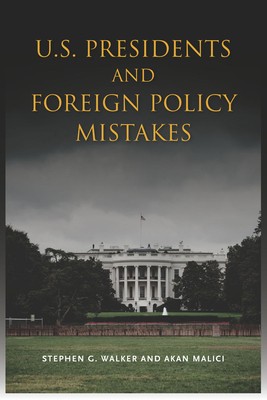
- We will send in 10–14 business days.
- Author: Stephen G Walker
- Publisher: STANFORD SECURITY STUDIES
- ISBN-10: 0804774994
- ISBN-13: 9780804774994
- Format: 15.2 x 22.6 x 2.3 cm, minkšti viršeliai
- Language: English
- SAVE -10% with code: EXTRA
Reviews
Description
Mistakes, in the form of bad decisions, are a common feature of every presidential administration, and their consequences run the gamut from unnecessary military spending, to missed opportunities for foreign policy advantage, to needless bloodshed. This book analyzes a range of presidential decisions made in the realm of US foreign policy--with a special focus on national security--over the past half century in order to create a roadmap of the decision process and a guide to better foreign policy decision-making in the increasingly complex context of 21st century international relations.
Mistakes are analyzed in two general categories--ones of omission and ones of commission within the context of perceived threats and opportunities. Within this framework, the authors discuss how past scholarship has addressed these questions and argue that this research has not explicitly identified a vantage point around which the answers to these questions revolve. They propose game theory models of complex adaptive systems for minimizing bad decisions and apply them to test cases in the Middle East and Asia.
EXTRA 10 % discount with code: EXTRA
The promotion ends in 23d.13:59:25
The discount code is valid when purchasing from 10 €. Discounts do not stack.
- Author: Stephen G Walker
- Publisher: STANFORD SECURITY STUDIES
- ISBN-10: 0804774994
- ISBN-13: 9780804774994
- Format: 15.2 x 22.6 x 2.3 cm, minkšti viršeliai
- Language: English English
Mistakes, in the form of bad decisions, are a common feature of every presidential administration, and their consequences run the gamut from unnecessary military spending, to missed opportunities for foreign policy advantage, to needless bloodshed. This book analyzes a range of presidential decisions made in the realm of US foreign policy--with a special focus on national security--over the past half century in order to create a roadmap of the decision process and a guide to better foreign policy decision-making in the increasingly complex context of 21st century international relations.
Mistakes are analyzed in two general categories--ones of omission and ones of commission within the context of perceived threats and opportunities. Within this framework, the authors discuss how past scholarship has addressed these questions and argue that this research has not explicitly identified a vantage point around which the answers to these questions revolve. They propose game theory models of complex adaptive systems for minimizing bad decisions and apply them to test cases in the Middle East and Asia.


Reviews